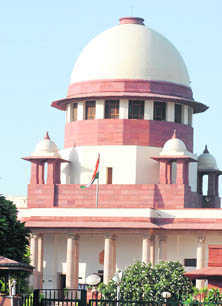Make Collegium transparent, Justice Chelameswar tells CJI
R Sedhuraman
Legal Correspondent
New Delhi, September 2
Justice J Chelameswar, a senior judge of the Supreme Court and a member of the five-member Collegium, has written to Chief Justice of India TS Thakur seeking transparency in the appointment of higher judiciary judges.
According to sources, Justice Chelameswar has decided against attending Collegium meetings unless the proceedings were recorded. In fact, he did not attend the meeting held on Thursday to discuss the government’s revised draft Memorandum of Procedure (MoP) for the appointment of high court and apex court judges.
Justice Chelameswar has suggested that the Collegium file be sent to him so that he could give his views in writing on the candidates proposed to be appointed as judges. The top five Supreme Court judges in the Collegium are CJI Thakur and Justices AR Dave, JS Khehar, Dipak Misra and Chelameswar.
Being part of the five-member Constitution Bench that had gone into the validity of the National Judicial Appointments Commission (NJAC) meant to replace the Collegium system, Justice Chelameswar had delivered the lone dissenting verdict upholding the NJAC Act. In the majority ruling, the other four judges had struck down the NJAC Act and revived the Collegium system. The judgment had come on October 16, 2015.
In his ruling, Justice Chelameswar had noted that Collegium had no accountability as its records were absolutely beyond the reach of even judges. Such state of affairs was not good for people and judiciary’s credibility, he had said.
Observing that mounting arrears was not a certificate of judiciary’s efficiency, Justice Chelameswar had said the onus of making the legal system efficient lay exclusively with the Supreme Court.
Just two days ago, a two-member Bench headed by him passed an order in the Madhya Pradesh Vyapam scam case, questioning the wisdom of a three-member Bench headed by Justice Khehar.
The three-member Bench had sought a clarification from the Justice Chelameswar Bench — whether all aspects of the Vyapam case should be revisited or only the point on which the smaller Bench had differed should be gone into.
Responding to the clarification, Justice Chelameswar Bench had remarked: “We completely fail to understand the reference made to Article 145(5) of the Constitution” dealing with intra-court appeals”.
“We are of the opinion that neither the Constitution of India nor any other law of this country provides an intra-court appeal insofar as the Supreme Court is concerned. A re-hearing of the entire matter as apparently suggested to the larger Bench, in our opinion, would amount to an intra-court appeal.”










